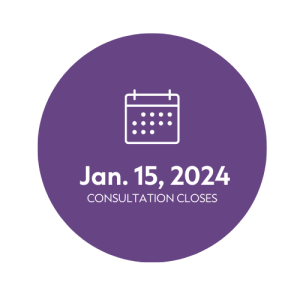About the consultation
 This consultation closed on Jan. 15, 2024.
This consultation closed on Jan. 15, 2024.Under Bill C-39, the Federal Government has proposed changes to allow medical assistance in dying (MAID) where a mental disorder is the sole underlying medical condition. With these changes potentially approved in March 2024, CPSA partnered with the College of Registered Nurses of Alberta (CRNA) to develop the joint “Medical Assistance in Dying (MAID) Alberta Guidelines.” This document, based on the “Model Practice for Medical Assistance in Dying (MAID)” standard developed by the MAID Practice Standards Task Group on behalf of Health Canada, will ensure consistent practice between physicians and registered nurses in Alberta.
The MAID standard was last updated earlier in 2023; however, mental disorders as the sole underlying medical condition and the MAID Guideline need to be included to ensure alignment with federal legislation should it be approved in the spring of 2024.
The Conscientious Objection and Informed Consent standards of practice are also under review to ensure alignment with the MAID standard, as they have not been reviewed since 2016.
MAID
Medical Assistance in Dying (MAID) is the administration or prescribing by a physician (MD) or nurse practitioner (NP) of a substance to a person, at their request, that causes death. In 2021, Bill C-7 came into effect, which expanded the eligibility of MAID to include individuals whose death is not reasonably foreseeable. After being delayed by one year, contingent on the approval of federal legislation, individuals whose sole underlying medical condition is mental illness will become eligible for MAID under Bill C-39 on March 17, 2024. To ensure accurate and timely information with this upcoming change, CPSA is updating our Medical Assistance in Dying (MAID) standard of practice. Respondents also had the opportunity to provide feedback on the joint “Medical Assistance in Dying (MAID) Alberta Guidelines” as part of the standard of practice consultation.
Conscientious Objection
The Conscientious Objection standard was last reviewed in 2016. Amendments to this standard are intended to better outline expectations for regulated members in navigating ethical dilemmas relating to personal beliefs and patient beliefs. The addition of a preamble, glossary and directions provide more context around when and how regulated members can decline to provide treatment and what must be provided for the patient to ensure they continue to receive high quality care.
* Based on initial feedback received, the term ‘effective referral’ will be removed from the Conscientious Objection standard. Those that provided feedback during the consultation period will be consulted again during the re-consultation phase and see additional edits before final approval.
Informed Consent
The Informed Consent standard (proposed new title: Informed Consent & Determining Capacity to Consent) was last reviewed in 2016. Expansion of the standard provides clarity around the recording consent process, patient autonomy, safety around respecting boundaries and circumstances where proceeding without consent is permitted. Through these clarifications, both regulated members and their patients are better protected and supported throughout the physician-patient relationship.
Your opinion matters
Your feedback is important as it helps us develop clear, reasonable expectations and helpful, applicable resources. We appreciate the time you took and the input you provided.
CPSA regulated members, partner organizations, other healthcare professionals and Albertans were invited to provide feedback from December 12, 2023 to January 15, 2024.
Anonymized feedback will be considered by Council at their March 2024 meeting. Once amendments are finalized and approved by Council, members will be notified by email and The Messenger newsletter.
We respect your privacy
All feedback is subject to CPSA’s Privacy Statement. CPSA reviews all comments before publication to ensure there is no offensive language, personal attacks or unsubstantiated allegations, and publishes them (where consent has been provided) as soon as possible.























